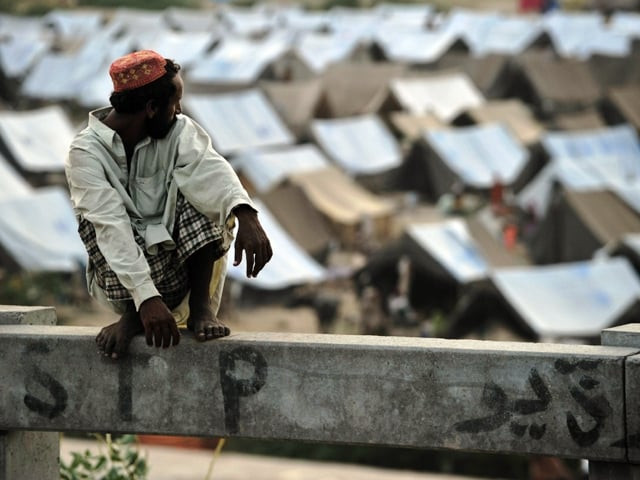Homeless, again
Sitting around those rendered homeless by the floods are the others who’ve lost homes for the second time.

Once, Hidayat Mehsud lived in the Badari area of South Waziristan. But the military operation Raah-e-Nijaat last October forced him to relocate to Naivela in Paroa tehsil. “As an IDP, I was only provided a tent, bedding and some utensils. Eventually, I rented a four-bedroom house myself and we built up our lives from scratch,” he says. And then came the rains. “All the rooms of our house collapsed and we lost everything we had left. Without any sort of aid from the authorities, we’re on the streets again.”
An estimated 300,000 Mehsud tribesmen flocked to Dera Ismail Khan in the wake of the operation. In the absence of IDP camps, these people moved in with host families or found rented accommodation.
Misaal Khan Mehsud tells a similar story. With his eight-member family in tow, in May last year, Mehsud moved from Sararogha in South Waziristan to Dera Ismail Khan for fear of a military operation. His salary as a primary school teacher was barely enough for the family so they rented a single room house in Shorkot area in the district for Rs2,500.
“But the house collapsed during the rains and the only suitable replacement was a two-room house I’m now paying Rs3,500 for,” he narrates in a small voice. “So many thousands of houses have been destroyed in the floods and the rents have risen prohibitively as a result.”
Going home isn’t an option and Misaal doubts it will ever be. “The insurgency is like a football match; till the final, we can’t predict the outcome,” he says.
“Some 300,000 Mehsud tribesmen from Ladha, Sararogha, Makeen, Tiarza and Sarawaki areas have been displaced and are facing hardship in Dera. The Taliban and the authorities can do whatever they like, as long as they leave the people alone.”
Makeen resident Sher Khan Mehsud has been luckier. He left his home days before the operation. Although his rented home stands a foot deep in water, it hasn’t collapsed so far.
But Manzai dweller Chaman Khel has been rendered homeless twice. “We managed to escape Waziristan with the clothes on our backs,” he recounts. The next few months were rebuilding life piece by piece. “The floods washed away everything,” he says bleakly. “The authorities come and prepare lists but nothing comes of these lists.”
Thirty-five-year-old Mohammad Bhittani from Manzai mistakes me for ‘the authorities’ and tries to get me to write his name in my notebook so he can get the aid promised to IDPs and flood victims. On finding out I’m just a reporter, he falls silent for a moment. “Write it down anyway,” he insists. “At least it will bring a bad name to the government.”
Published in The Express Tribune, August 31st, 2010.













COMMENTS
Comments are moderated and generally will be posted if they are on-topic and not abusive.
For more information, please see our Comments FAQ